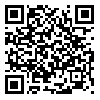مجله رویش روانشناسی از دادن گواهیهای کاغذی معذور است. لطفا تقاضا نکنید. همه گواهی ها در صفحه شخصی کاربران موجود است.
year 14, Issue 7 (Autumn1 2025 2025)
Rooyesh 2025, 14(7): 165-174 |
Back to browse issues page
Ethics code: IR.IAU.SARI.REC.1403.080
Download citation:
BibTeX | RIS | EndNote | Medlars | ProCite | Reference Manager | RefWorks
Send citation to:



BibTeX | RIS | EndNote | Medlars | ProCite | Reference Manager | RefWorks
Send citation to:
Zare F, Fakhri M K, Noruzi A. (2025). Comparing the effectiveness of mindful self-compassion and mentalization-based therapy on impulsivity in adolescents with self-injurious behaviors. Rooyesh. 14(7), 165-174.
URL: http://frooyesh.ir/article-1-6501-en.html
URL: http://frooyesh.ir/article-1-6501-en.html
1- PhD student in psychology, Department of Psychology, Sar.c., Islamic Azad University, Sari, Iran.
2- Assistant professor, Department of Psychology, Sar.c., Islamic Azad University, Sari, Iran. ,Mk.fakhri@iau.ac.ir
3- Assistant professor, Department of Psychology, Sar.c., Islamic Azad University, Sari, Iran.
2- Assistant professor, Department of Psychology, Sar.c., Islamic Azad University, Sari, Iran. ,
3- Assistant professor, Department of Psychology, Sar.c., Islamic Azad University, Sari, Iran.
Abstract: (657 Views)
The present study aimed to compare the effectiveness of mindful self-compassion (MSC) and mentalization-based therapy (MBT) on impulsivity in adolescents with self-injurious behaviors. The present study employed a quasi-experimental design with a pre-test and post-test, and included a control group with a one-month follow-up period. The statistical population of this study consisted of adolescents with self-injurious behaviors who referred to the counseling center of the Education Department in districts 8 and 13 of Tehran in 2024. 45 people were selected using convenience sampling and randomly assigned to three groups: experiment 1 (15 people), experiment 2 (15 people), and control (15 people). The Barratt Impulsivity Scale (BIS-11; Patton et al., 1995) was used to collect data. Mindfulness self-compassion (MSC) and mentalization-based therapy (MBT) were each administered in eight 90-minute sessions as a group. Data analysis was performed using repeated measures analysis of variance. The findings showed that, compared to the control group, the two interventions, mindful self-compassion (MSC) and mentalization-based therapy (MBT), were significantly effective in reducing impulsivity until the follow-up stage (P<0.05). The findings also showed that the mindful self-compassion intervention had a significantly greater effect on reducing impulsivity than the mentalization-based therapy (P<0.05). Overall, it can be concluded that mindful self-compassion (MSC) had a greater effect on reducing impulsivity in adolescents with self-injurious behaviors than did mentalization-based therapy (MBT).
Type of Article: Research |
Subject:
Clinical Psychology
Received: 2025/08/17 | Accepted: 2025/09/1 | ePublished: 2025/10/2
Received: 2025/08/17 | Accepted: 2025/09/1 | ePublished: 2025/10/2
Send email to the article author
| Rights and permissions | |
 |
This work is licensed under a Creative Commons Attribution-NonCommercial 4.0 International License. |





